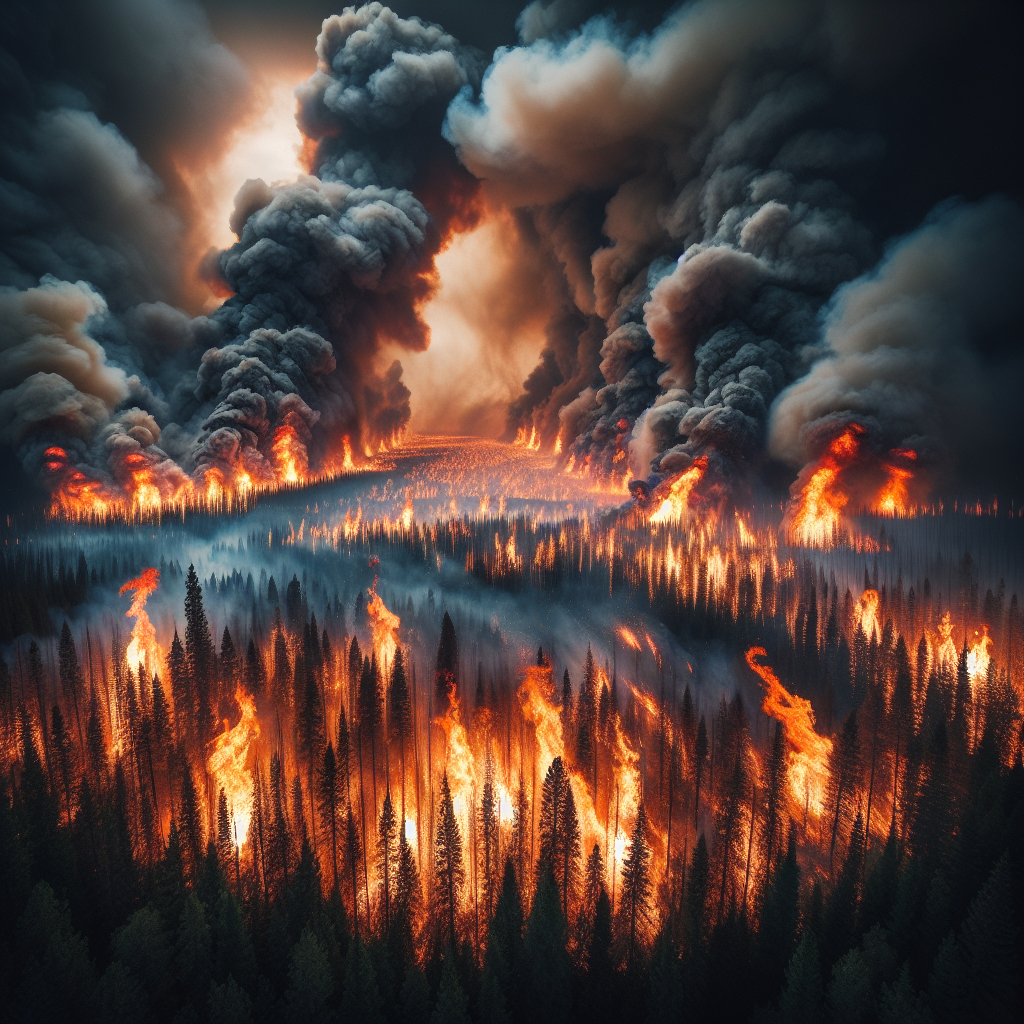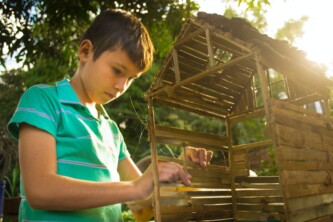Canada is having a lot of wildfires right now, especially in the western parts of the country. The fires are spreading because it’s really dry and there hasn’t been much rain. Thousands of people have had to leave their homes because of the fires. The town of Fort McMurray, which was already hit by fires in 2016, is being affected again. Other places like Fort Nelson and Cranberry Portage have also been impacted by the fires.
There are a few reasons why the fires are happening. Sometimes, strong winds knock over trees and they hit power lines, which starts fires. Lightning strikes are also a common cause. People doing careless things or even starting fires on purpose can also make the fires start. Climate change and hotter temperatures are making it easier for fires to happen in Canada. Places that are already dry are becoming even more at risk because of the warming climate.
The wildfire season in Canada is starting earlier and earlier each year. It used to start in July or August, but now it’s starting as early as May. Last year was the worst fire season ever, with a lot of land getting burned. This year, even though the season is starting early again, experts think it might not be as bad as last year. How bad the season is depends on the weather during the summer.
The Canadian government is warning that this year’s wildfire season could be really bad because of the warmer weather. But it’s important to remember that we won’t know for sure until the summer is over. People are working hard to stop the fires, but it might take a few weeks to put them all out. The smoke from the fires is also affecting the air quality in both Canada and the United States, so people need to be careful.
Original news source: Why is Canada having so many wildfires this season? (BBC)
🎧 Listen:
Slow
Normal
Fast
📖 Vocabulary:
| 1 | wildfires | Large, uncontrolled fires that burn in forests or grasslands |
| 2 | spreading | Moving or extending to a larger area |
| 3 | impacted | Strongly influenced or changed by something |
| 4 | careless | Not paying enough attention to avoid harm or mistakes |
| 5 | climate | The usual weather conditions in a place |
| 6 | temperatures | How hot or cold something is |
| 7 | risk | The possibility of something bad happening |
| 8 | experts | People who have a lot of knowledge or skill in a particular area |
| 9 | government | The group of people who control and make decisions for a country |
| 10 | warning | A statement that tells people about possible danger |
| 11 | season | A particular time of year when something happens |
| 12 | quality | How good or bad something is |
| 13 | affected | Changed in a harmful way |
| 14 | immediate | Needing to be dealt with right away |
| 15 | recover | To get better after something bad happens |
Group or Classroom Activities
Warm-up Activities:
– News Summary
Instructions: Divide the students into pairs or small groups. Give each group a copy of the article. Instruct them to read the article and summarize the main points in their own words. After a designated amount of time, have each group share their summaries with the class.
– Opinion Poll
Instructions: Divide the students into pairs or small groups. Give each group a list of questions related to the article, such as “Do you think climate change is a major factor in the increase of wildfires in Canada?” or “Should stricter measures be taken against people who start fires on purpose?” Instruct the students to discuss the questions and record their opinions. After a designated amount of time, have a class discussion where groups share their opinions.
– Sketch It
Instructions: Give each student a blank piece of paper and a pen or pencil. Instruct them to read the article and choose a scene or event to sketch. They should draw a visual representation of their chosen scene, using the information from the article as inspiration. After a designated amount of time, have students share their sketches with the class and explain their choices.
– Vocabulary Pictionary
Instructions: Write a list of vocabulary words from the article on the board. Divide the students into pairs or small groups. Instruct each group to choose a word from the list and draw a quick sketch to represent that word. The other group members must guess the word based on the sketch. After a designated amount of time, have groups switch roles and continue playing.
– Think-Pair-Share
Instructions: Instruct the students to individually read the article and think about the following question: “What are the potential consequences of the increasing number of wildfires in Canada?” After a few minutes, have the students pair up and discuss their thoughts with their partner. Finally, have a class discussion where students share their ideas and opinions.
🤔 Comprehension Questions:
1. Why are there a lot of wildfires in Canada right now?
2. What are some reasons why the fires are spreading?
3. Which towns in Canada have been affected by the fires?
4. Why are fires becoming more common in Canada?
5. When does the wildfire season in Canada usually start?
6. Was last year’s fire season worse than this year’s?
7. What is the Canadian government warning about this year’s wildfire season?
8. How are the fires affecting the air quality in Canada and the United States?
Go to answers ⇩
🎧✍️ Listen and Fill in the Gaps:
Canada is having a lot of wild(1)______ right now, especially in the western (2)______ of the country. The fires are spreading because it’s really dry and there hasn’t been much rain. Thousands of (3)______ have had to leave their homes because of the fires. The town of Fort McMurray, which was already hit by fires in 2016, is being affected again. Other places like Fort (4)______ and Cranberry Portage have also been impacted by the fires.
There are a few (5)______ why the fires are happening. Sometimes, strong (6)______ knock over trees and they hit power lines, which starts fires. Lightning strikes are also a common (7)______. People doing (8)______ things or even starting fires on purpose can also make the fires start. Climate change and hotter temperatures are making it easier for fires to happen in Canada. Places that are already dry are becoming even more at risk because of the warming climate.
The wildfire (9)______ in (10)______ is (11)______ing earlier and earlier each year. It used to start in July or August, but now it’s starting as early as May. Last year was the (12)______ fire season ever, with a lot of land getting burned. This year, even though the season is starting early again, experts think it might not be as bad as last year. How bad the season is depends on the weather during the summer.
The (13)______ government is warning that this year’s wildfire season could be really bad because of the warmer weather. But it’s important to remember that we won’t know for sure until the summer is over. People are working hard to stop the fires, but it might take a few (14)______ to put them all out. The smoke from the fires is also (15)______ the air quality in both Canada and the United (16)______, so people need to be careful.
Go to answers ⇩
💬 Discussion Questions:
Students can ask a partner these questions, or discuss them as a group.
1. What do you think it would be like to have to leave your home because of a wildfire?
2. How would you feel if your town was hit by a wildfire two years in a row?
3. Do you think climate change is making wildfires worse? Why or why not?
4. How do you think the earlier start to the wildfire season affects people’s lives?
5. What do you think the government can do to prevent wildfires?
6. How would you feel if you had to live with the smoke from the fires affecting the air quality?
7. Do you think it’s important for people to be careful and take precautions during wildfire season? Why or why not?
8. What do you think are some of the challenges faced by the people working to stop the fires?
9. Have you ever experienced a natural disaster? How did it make you feel?
10. What do you think are some ways that communities can support each other during a wildfire?
11. How do you think the wildlife is affected by the wildfires?
12. Do you think it’s fair to blame people for starting fires on purpose? Why or why not?
13. How do you think the fires impact the economy of the affected areas?
14. What do you think are some long-term solutions to prevent wildfires from happening?
15. How do you think the wildfires in Canada compare to wildfires in other parts of the world?
Individual Activities
📖💭 Vocabulary Meanings:
Match each word to its meaning.
Words:
1. wildfires
2. spreading
3. impacted
4. careless
5. climate
6. temperatures
7. risk
8. experts
9. government
10. warning
11. season
12. quality
13. affected
14. immediate
15. recover
Meanings:
(A) To get better after something bad happens
(B) Changed in a harmful way
(C) How hot or cold something is
(D) People who have a lot of knowledge or skill in a particular area
(E) Strongly influenced or changed by something
(F) The group of people who control and make decisions for a country
(G) The usual weather conditions in a place
(H) Moving or extending to a larger area
(I) The possibility of something bad happening
(J) Large, uncontrolled fires that burn in forests or grasslands
(K) Not paying enough attention to avoid harm or mistakes
(L) A statement that tells people about possible danger
(M) A particular time of year when something happens
(N) Needing to be dealt with right away
(O) How good or bad something is
Go to answers ⇩
🔡 Multiple Choice Questions:
1. Why are there a lot of wildfires in Canada right now?
(a) There are too many trees in the country.
(b) It’s really dry and there hasn’t been much rain.
(c) The government is starting fires on purpose.
(d) The weather is too cold and causing the fires.
2. Which town has been affected by wildfires in both 2016 and now?
(a) Fort Nelson
(b) Cranberry Portage
(c) Fort McMurray
(d) None of the above
3. What are some common causes of the wildfires in Canada?
(a) Lightning strikes.
(b) People starting fires on purpose.
(c) All of the above
(d) Strong winds knocking over trees and hitting power lines.
4. How is climate change contributing to the wildfires in Canada?
(a) It’s making the country wetter, making it harder for fires to start.
(b) It’s making the country drier and increasing the risk of fires.
(c) It’s not affecting the wildfires at all.
(d) It’s making the country colder, causing the fires.
5. When did the wildfire season in Canada used to start?
(a) May
(b) July or August
(c) June
(d) September
6. What was last year’s fire season like in Canada?
(a) The worst ever, with a lot of land getting burned.
(b) There were no wildfires last year.
(c) It was a mild fire season with very few fires.
(d) It was the same as every other year.
7. What is the Canadian government warning about this year’s wildfire season?
(a) It could be really bad because of the warmer weather.
(b) It won’t be as bad as last year.
(c) There won’t be any wildfires this year.
(d) The fires will only affect certain areas.
8. How long might it take to put out all the fires in Canada?
(a) A few days
(b) Several months
(c) A few weeks
(d) They won’t be able to put them all out.
Go to answers ⇩
🕵️ True or False Questions:
1. The wildfire season in Canada is starting later each year, now beginning as late as May.
2. Thousands of people have been forced to evacuate their homes because of the fires.
3. The fires are spreading due to the dry conditions and lack of rain.
4. Weak winds gently swaying trees and missing power lines, as well as sunshine strikes, are common causes of the fires.
5. Canada is not currently experiencing a significant number of wildfires, particularly in the western parts of the country.
6. The town of Fort McMurray, which was previously affected by fires in 2016, is being impacted again.
7. Other areas like Fort Nelson and Cranberry Portage have not been affected by the fires.
8. Climate change and hotter temperatures are making it easier for fires to occur in Canada, especially in already dry areas.
Go to answers ⇩
📝 Write a Summary:
Write a summary of this news article in two sentences.
Check your writing now with the best free AI for English writing!
Writing Questions:
Answer the following questions. Write as much as you can for each answer.
Check your answers with our free English writing assistant!
1. Why are there a lot of wildfires in Canada right now?
2. What are some reasons why the fires are spreading?
3. How is climate change contributing to the wildfire problem in Canada?
4. How has the wildfire season in Canada changed over the years?
5. What is the Canadian government warning about this year’s wildfire season?
✅ Answers
🤔✅ Comprehension Question Answers:
1. Why are there a lot of wildfires in Canada right now?
– There are a lot of wildfires in Canada right now because it’s really dry and there hasn’t been much rain.
2. What are some reasons why the fires are spreading?
– The fires are spreading because of strong winds knocking over trees and hitting power lines, lightning strikes, and sometimes people doing careless things or starting fires on purpose.
3. Which towns in Canada have been affected by the fires?
– The towns of Fort McMurray, Fort Nelson, and Cranberry Portage have been affected by the fires.
4. Why are fires becoming more common in Canada?
– Fires are becoming more common in Canada because of climate change and hotter temperatures. The warming climate is making already dry places even more at risk for fires.
5. When does the wildfire season in Canada usually start?
– The wildfire season in Canada usually starts in July or August.
6. Was last year’s fire season worse than this year’s?
– Last year’s fire season was worse than this year’s.
7. What is the Canadian government warning about this year’s wildfire season?
– The Canadian government is warning that this year’s wildfire season could be really bad because of the warmer weather.
8. How are the fires affecting the air quality in Canada and the United States?
– The fires are affecting the air quality in both Canada and the United States, causing smoke and potentially harmful particles to be in the air.
Go back to questions ⇧
🎧✍️✅ Listen and Fill in the Gaps Answers:
(1) fires
(2) parts
(3) people
(4) Nelson
(5) reasons
(6) winds
(7) cause
(8) careless
(9) season
(10) Canada
(11) start
(12) worst
(13) Canadian
(14) weeks
(15) affecting
(16) States
Go back to questions ⇧
📖💭✅ Vocabulary Meanings Answers:
1. wildfires
Answer: (J) Large, uncontrolled fires that burn in forests or grasslands
2. spreading
Answer: (H) Moving or extending to a larger area
3. impacted
Answer: (E) Strongly influenced or changed by something
4. careless
Answer: (K) Not paying enough attention to avoid harm or mistakes
5. climate
Answer: (G) The usual weather conditions in a place
6. temperatures
Answer: (C) How hot or cold something is
7. risk
Answer: (I) The possibility of something bad happening
8. experts
Answer: (D) People who have a lot of knowledge or skill in a particular area
9. government
Answer: (F) The group of people who control and make decisions for a country
10. warning
Answer: (L) A statement that tells people about possible danger
11. season
Answer: (M) A particular time of year when something happens
12. quality
Answer: (O) How good or bad something is
13. affected
Answer: (B) Changed in a harmful way
14. immediate
Answer: (N) Needing to be dealt with right away
15. recover
Answer: (A) To get better after something bad happens
Go back to questions ⇧
🔡✅ Multiple Choice Answers:
1. Why are there a lot of wildfires in Canada right now?
Answer: (b) It’s really dry and there hasn’t been much rain.
2. Which town has been affected by wildfires in both 2016 and now?
Answer: (c) Fort McMurray
3. What are some common causes of the wildfires in Canada?
Answer: (d) Strong winds knocking over trees and hitting power lines.
4. How is climate change contributing to the wildfires in Canada?
Answer: (d) It’s making the country colder, causing the fires.
5. When did the wildfire season in Canada used to start?
Answer: (b) July or August
6. What was last year’s fire season like in Canada?
Answer: (a) The worst ever, with a lot of land getting burned.
7. What is the Canadian government warning about this year’s wildfire season?
Answer: (a) It could be really bad because of the warmer weather.
8. How long might it take to put out all the fires in Canada?
Answer: (c) A few weeks
Go back to questions ⇧
🕵️✅ True or False Answers:
1. The wildfire season in Canada is starting later each year, now beginning as late as May. (Answer: False)
2. Thousands of people have been forced to evacuate their homes because of the fires. (Answer: True)
3. The fires are spreading due to the dry conditions and lack of rain. (Answer: True)
4. Weak winds gently swaying trees and missing power lines, as well as sunshine strikes, are common causes of the fires. (Answer: False)
5. Canada is not currently experiencing a significant number of wildfires, particularly in the western parts of the country. (Answer: False)
6. The town of Fort McMurray, which was previously affected by fires in 2016, is being impacted again. (Answer: True)
7. Other areas like Fort Nelson and Cranberry Portage have not been affected by the fires. (Answer: False)
8. Climate change and hotter temperatures are making it easier for fires to occur in Canada, especially in already dry areas. (Answer: True)
Go back to questions ⇧















